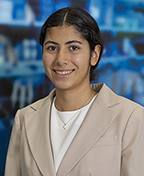
School: Arizona State University
Hometown: Scottsdale, Arizona
Daily Mentor: Candice Wike, PhD
PI: Stephanie Pond, PhD
Cell-free DNA (cfDNA) is released into an individual’s bloodstream when cells die and lyse. A special type of cfDNA is called circulating tumor DNA (ctDNA), which is released from tumor cells. There is currently immense interest in researching ctDNA because it can be used as a biomarker to detect cancer at earlier stages via a cost-effective and minimally invasive liquid blood biopsy. For example, a classic distinction between cfDNA and ctDNA is that ctDNA is of a smaller fragment size, approximately 120-150 base pairs long, while cfDNA ranges from 150-190bp. After cfDNA is extracted from a patient’s plasma, it can be converted into a library and put on a Next Generation Sequencer (NGS). The data can then be compared for fragment size discrepancies and/or possible mutations. This project focuses on the preparation of cfDNA for sequencing by comparing the conversion rates of two library prep kits. This project is impactful because if a library prep kit is able to adequately ligate adapters and PCR amplify, there will be a larger proportion of cfDNA making it onto the sequencer to be screened for downstream analysis. We have found that a newly emerging library prep kit has a significantly higher conversion rate than the current library prep being utilized at TGen. As library preparation is key for all downstream analysis, the new library prep kit tested may make liquid blood biopsies even more accurate, reliable, and common as an early screening method for cancer.